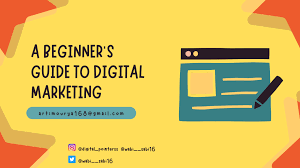In today's fast-paced digital landscape, businesses of all sizes are striving to establish a robust online presence. Digital marketing has become an indispensable tool in achieving this goal. For beginners, navigating the world of digital marketing can be overwhelming, but with the right training and guidance, anyone can become proficient in this field. In this beginner's guide to digital marketing training, we'll cover essential concepts, resources, and steps to kickstart your journey into the exciting realm of digital marketing.
Understanding Digital Marketing
The term "digital marketing" refers to a broad range of Internet marketing techniques and methods. It leverages digital channels such as websites, search engines, social media platforms, email, and more to connect with target audiences. Here are some fundamental concepts to grasp before delving into training:
Channels: Familiarize yourself with the various digital marketing channels available, including social media marketing, affiliate marketing, pay-per-click (PPC) advertising, content marketing, email marketing, and search engine optimization (SEO).
Audience Targeting: Understand the importance of identifying and reaching your target audience through demographics, interests, and behaviors.
Metrics and Analytics: Learn how to measure the performance of your digital marketing efforts using key metrics like click-through rates (CTR), conversion rates, and return on investment (ROI).
Getting Started with Digital Marketing Training
Now that you have a basic understanding of digital marketing, it's time to embark on your training journey:
1. Online Courses:
Platforms like Coursera, Udemy, and LinkedIn Learning offer a wide range of digital marketing courses for beginners.
Start with courses like "Digital Marketing Fundamentals" to build a strong foundation.
2. Blogs and Websites:
Follow digital marketing blogs and websites like Moz, Neil Patel, and HubSpot to stay updated with the latest trends and tips.
Subscribe to newsletters for regular updates.
3. Videos on YouTube:
Digital marketing lessons and instructions may be found in abundance on YouTube.
Channels like "Google Ads" and "SEMrush" offer in-depth explanations and how-to videos.
4. Books:
Consider reading books like "Digital Marketing for Dummies" by Ryan Deiss and Russ Henneberry or "Contagious: How to Build Word of Mouth in the Digital Age" by Jonah Berger.
5. Social Media Communities:
Join digital marketing groups on platforms like LinkedIn and Facebook.
Engage in discussions, ask questions, and learn from experienced professionals.
6. Google's Digital Garage:
Google offers a free online training platform called Digital Garage, which covers various aspects of digital marketing, including Google Ads and Analytics.
7. HubSpot Academy:
HubSpot provides free digital marketing courses, including certifications in inbound marketing, content marketing, and social media strategy.
8. SEO Learning Center:
If you're interested in SEO, explore Google's SEO Learning Center for comprehensive resources and guidelines.
Hands-On Learning
Theory is essential, but practical experience is equally crucial. Here's how you can gain hands-on experience:
1. Create a Blog or Website:
Start a personal blog or website to apply what you've learned about content marketing and SEO.
Experiment with different types of content, such as blog posts, videos, or infographics.
2. Social Media Management:
Manage social media accounts for yourself or volunteer to do so for a non-profit organization.
Learn to schedule posts, engage with followers, and analyze social media data.
3. Google Ads and PPC Campaigns:
Set up a Google Ads account and run a small PPC campaign to understand keyword research, ad creation, and bidding strategies.
4. Email Marketing:
Build an email list and send regular newsletters or promotions.
Use email marketing platforms like Mailchimp or Constant Contact to automate the process.
5. Analytics and Reporting:
Practice using tools like Google Analytics to monitor website traffic and user behavior.
Create reports and analyze data to make informed marketing decisions.
Staying Updated: Digital marketing is a dynamic field that evolves rapidly. To stay current:
Continuously Learn: Dedicate time each week to learn about new trends and updates in digital marketing.
Networking: Attend digital marketing conferences, webinars, and local meetups to connect with industry experts and peers.
Certifications: Pursue advanced certifications such as Google Ads, Google Analytics, or Facebook Blueprint to demonstrate your expertise.
Experiment: Don't be afraid to try new strategies and tools. Digital marketing is about testing and optimizing.
In conclusion, embarking on a journey into digital marketing as a beginner may seem challenging, but with dedication, resources, and hands-on experience, you can become proficient in this field. Remember that digital marketing is a continuous learning process, so stay curious and adaptable as you explore the vast opportunities it offers. Whether you're interested in SEO, social media marketing, content marketing, or paid advertising, the key is to start learning, experimenting, and building your skills one step at a time. Good luck with your digital marketing training journey!





Comments